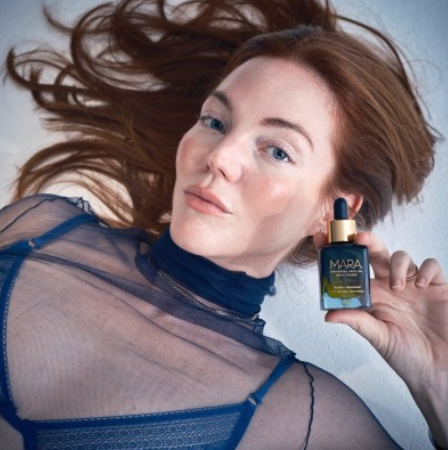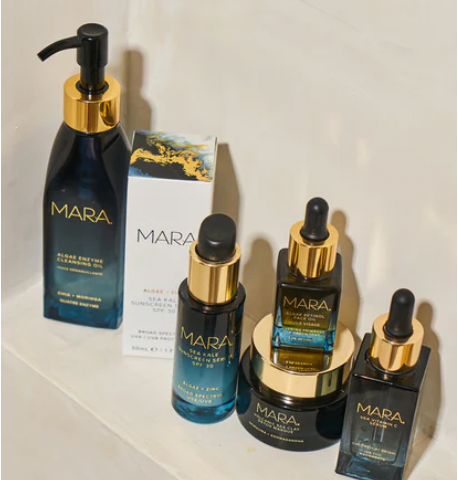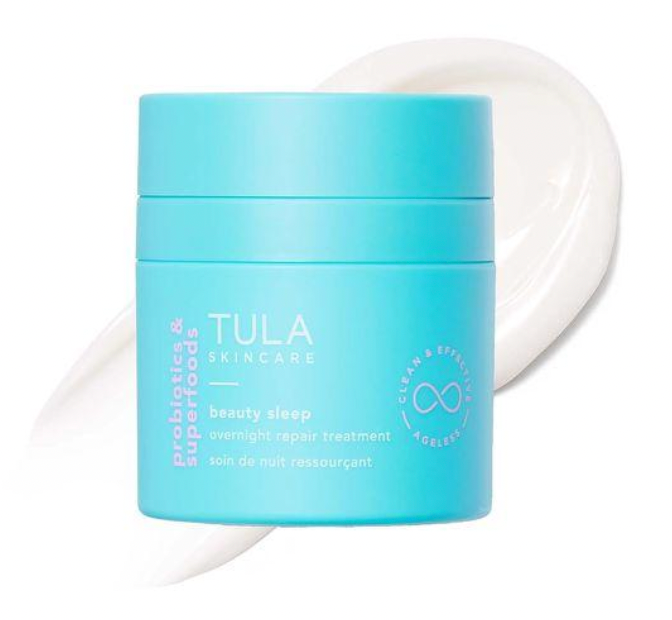USC Alumni Spotlight: Allison McNamara
- Mia Lombardo

- Sep 29, 2024
- 8 min read
Last week, we had the privilege of connecting with several inspiring entrepreneurs in the beauty industry, including former Trojan Allison McNamara. After a successful career in journalism, Allison boldly pivoted to launch a self-funded clean beauty brand, turning her passion into a thriving business. Her journey from media to entrepreneurship highlights the importance of embracing change and pursuing what truly drives you, offering invaluable insights for aspiring beauty professionals.
Allison’s Career

Allison McNamara's career is rooted in her extensive background in media, fashion, and beauty. She has experience as a fashion and beauty reporter, working for high-profile outlets like POPSUGAR and Refinery29, where she gained valuable insights into industry trends and consumer preferences. During this time, she also honed her skills as a producer and on-camera host, developing a deep understanding of storytelling and branding. In addition to her work in digital media, Allison appeared on television networks such as E! News and TV Guide, further expanding her expertise and influence in the beauty space.
MARA Beauty

Allison launched MARA Beauty, a self-funded clean skincare brand, in 2018 and was inspired by her passion for natural, high-performance skincare. The brand is best known for its luxurious, algae-infused formulas that harness the power of marine botanicals, active natural ingredients, and potent oils. MARA’s mission is to deliver effective, results-driven products while maintaining a strong commitment to sustainability. The brand’s signature product, the Universal Face Oil, has gained a cult following for its nourishing and glow-enhancing properties. With its focus on clean, non-toxic formulations and eco-conscious practices, MARA Beauty has quickly become a favorite among skincare enthusiasts seeking radiant, healthy skin.
Advice From Allison
Q: Do you have a piece of advice that you strive to live by?
AM: Don’t be afraid to start something over or start something from scratch again. I was a television host and journalist for a decade, and then I launched this business at 31 years old. A lot of times, in college, you almost feel boxed into whatever it is that you’re studying or what you originally thought you were going to pursue. And don’t let that hold you back from going with your gut and pursuing a great idea. I think some of the most beautiful things created come from places of uncertainty, so don’t be afraid to start over.
Q: Can you share a valuable lesson you've learned from your career journey that has influenced your personal and professional growth?
AM: The big thing with entrepreneurship is getting over the concept of self-doubt. I think a lot of us feel, when you first start your business, that you don’t deserve to be there. And just growing as an individual is really important for the growth of the business. So for me, it's feeling confident in my skill set and knowing that I have a clear vision and I created this brand. I’m here because I’ve earned it and I’ve worked for it—and I deserve to be here. That’s something that’s lingered throughout my entire journey as an entrepreneur, you know, self-growth and getting rid of that self-doubt.
You have to be really comfortable with the nos. All the nos that I received early on in this process made me so much stronger, and you can’t let those nos get you down. You have to take them as “not right nows.” Recently, a year and a half ago, we launched at my dream retailer, Sephora. I’d been wanting to launch with them since I was vision boarding this brand—I created the brand to be on a shelf at Sephora. And, of course, I got a lot of “not right nows,” up until before we launched. You have to use that as fuel to the fire.
Q: [I asked Allison for advice on overcoming self-doubt and imposter syndrome.]
AM: Honestly, it’s just practice and repetition of everything, right? I can speak to my example. I never doubted myself in the context of what I was able to create, but I would get around a bunch of other founders whose brands I really looked up to, and I would feel small or insecure. But you have to remember that you were invited to these places just as they were. You have a seat at the table. It’s not like you begged to be there. You’ve been invited or you were asked to speak at that opportunity. Just putting yourself out there over and over again makes it easier. Self-doubt diminishes as you put yourself out there more. I think if you are experiencing self-doubt, lean into the areas where you’re finding the most doubt. If it's public speaking, talking about your brand, your elevator pitch, talking with your manufacturers, whatever the hard part is for you, lean into that more and try to strengthen that skill set. The more you do anything the more confident you are with it.
Q: Can you describe a moment in your career where you had to take a leap of faith? How did you handle it, and would you approach it differently today?
AM: I would definitely not approach it differently because I believe everything happens for a reason. But 100%, I had a really hard choice—at least it was hard for me—I was a television host and journalist for a decade. I had a bunch of shows on POPSUGAR, on Refinery 29, I went to linear television for a show called POPSUGAR Now on Pop TV. That got canceled and that was like my dream show, I always wanted to host an entertainment news show. I was also doing other things, I had a show on FYI Network, I was doing the Oscars for the ABC red carpets. But ultimately, the main bread and butter of my income was that show on Pop TV. And when that got canceled, I really had to reevaluate—do I want to keep doing this forever? This was 2015, and I realized the way that we were getting our news was no longer waiting to watch E! News. We had Instagram and that’s where people were putting all of their news out. Celebrities weren’t waiting to do interviews anymore, they were releasing news themselves. So the news cycle changed.
To answer your question, I made this choice where I had this idea for MARA, my family’s in skincare, and I was a beauty journalist—so I knew this industry in and out—but I almost felt like I didn’t have the qualifications to do it. So really slowly and intentionally, I started planting the seeds of MARA in 2015 and ended up launching it as a side hustle in 2018. I was still working full time, doing production, entertainment, freelance writing for different outlets. I launched the line in 2018—took that big leap of faith. It picked up pretty quickly, but I still worked my other job the whole way up until 2022 because I’m self funded. I didn’t take on any traditional investments, but in order to do that I maintained a second business. I was working both businesses full time in order to pay myself from that business to keep all the money inside MARA. So a leap of faith was definitely taken, and I’m so glad I did it.
Q: What project or achievement are you most proud of? What lessons did you learn from that experience?
AM: Oh my gosh, I have two. Sephora, obviously—I’ve talked about this a lot—but just being recognized by the world’s greatest beauty retailer is like the best stamp of approval you can get. That was such a big goal for me, and getting into all the instore Sephoras—huge. And the other thing would be all of the organic celebrity mentions we’ve had. We don’t have a big budget to pay people, I wish we did and we totally would, we just can’t. But to get the love and support from these people with massive platforms because they truly love the product—many times they're buying it themselves or they found it through someone else. To not only buy it and use it, but to take the real estate that they know is valuable on their own social platforms and magazines to share the brand is just so cool. Like wow! Hailey Beiber used my cleanser, and I know we didn’t send it to her, so how’d she get it?! You know? They found it and purchased it on the website. Or Chrissy Teigen, I remember, was really instrumental for us too. And there’ve been so many people since, but those are probably the coolest milestones for me.
Q: When things don’t go as planned, how do you bounce back? What strategies do you use to stay focused and continue moving forward?
AM: I think one of my greatest strengths as a business owner is that there’s always a solution. You can’t be so caught up and stuck in your ways because things always go wrong. And by wrong I mean you missed delivery windows, there’s a delay at the port, there’s something at customs. There will inevitably be a fire that you’re putting out almost every single day, but I always say growth is in the recovery. So how you recover from getting that news, and how quickly you can recover, is how quickly you’re going to bounce back. So you can’t really stew over these things for so long, you have to be agile and quick. And I think that also comes with experience. When I was just starting out with this business I would definitely freak out with the news that I would get. And then I’d have to take a deep breath and logically think through my steps. But I think now that I’ve been doing this since 2015, I definitely have a rolodex of Plan A, Plan B, Plan C, Plan D, Plan Z. I have plans for everything, so you just have to roll with the punches and recover quickly. And all those plans are possible roads, sometimes the best road is the one you come up with on the spot, but at least you have the preparation and knowledge of your backup. I always use those moments as the universe directing me, so I kind of lean into it.
Q: With trends in the beauty industry constantly changing, how do you stay up to date? What resources do you recommend for aspiring beauty business leaders?
AM: I think the big thing here is to make sure that you are constantly checking the trade magazines. There’s Beauty Independent, BeautyMatter, Glossy, Women’s Wear Daily. Those are going to give you the bread and butter of this industry from an inside perspective, so it’s really important to make sure you’re keeping up with that if this is something that you want to do. And the other thing that a lot of brand founders get caught up with is, people look too much at the competition. Focus on your own innovation and your own growth. A lot of these formulas I’m working on 3-4 years in advance, so I don’t know that sea moss is going to be trending at Erewhon. But a lot of times, serendipitously, it just so happens that I’m at the pulse of what society is moving towards. That’s partially luck and partially being on the pulse of what society’s thinking is going to be cool. Really focusing down on your own creation, and not focusing on what everyone else is doing, is so integral to being successful and to being an innovator in this space. If you’re always in the hamster wheel cycle of copying people, you’re missing out on the opportunity to grow because the people that you’re copying are already five steps ahead working on their next thing. So if you can be the leader—like keep blinders on and be the leader in your space versus trying to emulate the success of others—that is a surefire way to build a longstanding brand.
Thank you, Allison, for sharing your experience and advice with BCC!



Comments